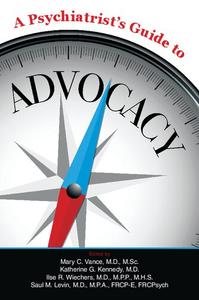
A Psychiatrist's Guide to Advocacy by Mary C. Vance, Katherine G. Kennedy, Ilse R. Wiechers, Saul M. Levin
2020 | ISBN: 1615372334 | English | 458 pages | PDF | 8 MB
Overcoming fear, ambivalence, and inertia to act on behalf of self or others can be difficult even for mental health clinicians who are accustomed to helping patients overcome challenges. A Psychiatrist's Guide to Advocacy explores the diverse definitions of advocacy and helps to identify methods and opportunities for advocacy by mental health practitioners. The editors argue for a greater culture of advocacy among psychiatrists in order to effect broad and lasting systemic and structural change. A noteworthy example is the push for insurance coverage parity between mental health and other medical care. However, legislative advocacy is just one of the many types explored in the book; advocacy takes many forms, including patient-level advocacy, organizational advocacy, education and research as advocacy, and media-targeted advocacy. Also addressed are specific issues of advocacy for special populations, including children and families, older adults, LGBTQ patients, and veterans. Taken together, these chapters represent a practical toolkit for mental health advocacy in its myriad forms.
In prose both compelling and accessible, the volume - Identifies five of the most pressing systemic problems in mental health care (lack of access to quality payer-covered, evidence-based mental health care; the psychiatry workforce shortage; lack of parity for mental health care compared with other forms of health care; the stigma against both consumers and providers of treatment for mental disorders, including substance use disorders; and high rates of physician burnout) and explains how advocacy at different levels can address these issues. - Describes the essential factors needed for effective advocacy, with emphasis on pathways to mentorship, providing examples of what integrating advocacy into the psychiatrist's career path looks like and identifying strategies to encourage lifelong advocacy- Delineates the advocacy needs of diverse patient populations, including children, families, and older adults; LGBTQ, non-native, and substance-using patients; veterans and military service members; and more- Includes four substantive interviews with advocacy role models who embody and embrace the advocate's mission, expressed in actions and on platforms that are diverse and illustrative- Includes learning objectives that tell readers what they can expect to master by the end of each chapter, allowing for focused reading and easy review
A Psychiatrist's Guide to Advocacy is a call for action and a blueprint for change, providing clinicians with the foundation for recognizing their opportunities and embracing their roles as advocates.
Buy Premium From My Links To Get Resumable Support,Max Speed & Support Me



